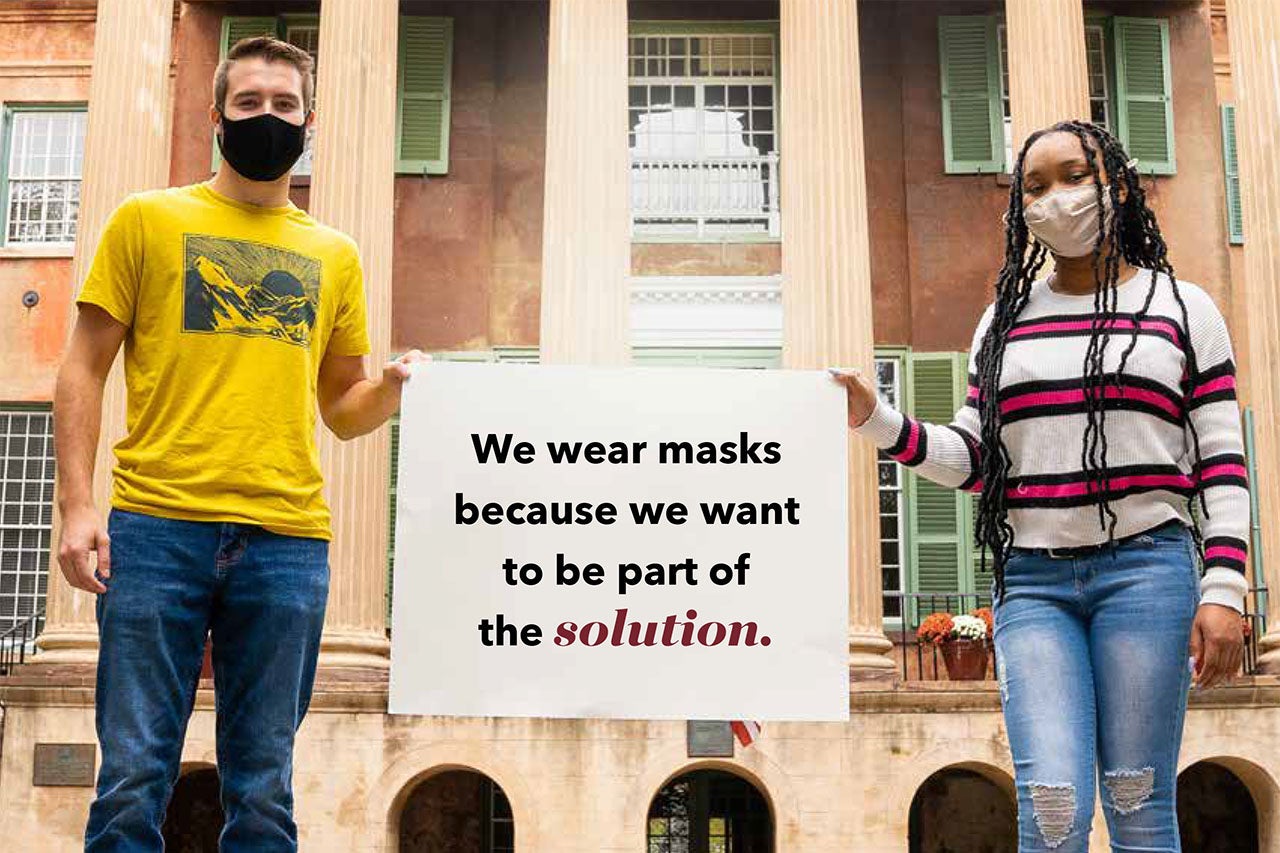Sometimes, being a follower isn’t such a bad thing. Especially when it comes to helping curb the spread of COVID-19.
That’s why, last spring, members of the College of Charleston’s Women’s Health Research Team decided to focus their annual Student Health Survey and subsequent BeWell campaign on handwashing, social distancing and wearing face coverings, as well as other facets of COVID-19.
More than 1,000 CofC students participated in the survey, which was disseminated in April 2020 and included questions about the preventative behaviors students could adopt to reduce COVID-19 infections, their perceptions regarding the severity of and susceptibility to the virus and perceived effectiveness of different preventative behaviors. The survey also included an open-ended question about how students perceived the pandemic to have impacted them.
 “Most responses fell under more than one category, which displayed that students faced many different stressful situations at once,” says public health major and student health survey team member Samantha Petillo. “Responses ranged from academic stress, to financial strain, to even grief.”
“Most responses fell under more than one category, which displayed that students faced many different stressful situations at once,” says public health major and student health survey team member Samantha Petillo. “Responses ranged from academic stress, to financial strain, to even grief.”
The data gathered led the research team to craft this year’s BeWell campaign around students’ attitudes about ways to reduce the spread of COVID-19 and the effectiveness of those measures. Across campus and online, posters, social media posts and testimonials encourage students to adopt preventative behaviors. Messages such as, “We wear masks because we want to be part of the solution,” aim to encourage students to make health-promoting decisions. Other campaign messages follow a social norming approach to help inform students of the preventative measures their classmates are taking. For example:
- 89% of students report regularly washing their hands to prevent the spread of COVID-19.
- 92% of students felt social distancing was an effective way to reduce the spread of COVID-19.
- 86% of students are concerned about transmitting COVID-19 to others without knowing they have it.
“As a public health major, pandemics are right up my interest alley, so I was more than willing to participate,” says student researcher Duncan Weller. “I was also part of the COVID-19 Student Input Group for CofC, so I got to see not only how students were impacted, but also what the faculty was doing to help students and it allowed me to be a voice for students on campus.”
A lot has happened since the survey last year, especially with changes in transmission rates and available measures to reduce the spread of the virus. In light of this, the team plans to collect additional data this spring to assess how students’ attitudes toward COVID-19 and related prevention efforts have changed. Possible questions might ask students to describe how social media has impacted their perceptions of COVID-19 and how the pandemic continues to affect their lives.
 Launched in 2017, the annual BeWell campaign uses social norming approaches designed to correct misperceptions of perceived behaviors among college aged students. Each year, Christy Kollath-Cattano, associate professor of public health, and Sarah Hatteberg, assistant professor of sociology, lead a small team of student-researchers to collect and analyze data through the Student Health Survey and develop initiatives aimed at correcting misconceptions.
Launched in 2017, the annual BeWell campaign uses social norming approaches designed to correct misperceptions of perceived behaviors among college aged students. Each year, Christy Kollath-Cattano, associate professor of public health, and Sarah Hatteberg, assistant professor of sociology, lead a small team of student-researchers to collect and analyze data through the Student Health Survey and develop initiatives aimed at correcting misconceptions.
As part of this effort, student-researchers like Weller and Petillo develop survey questions, recruit study participants, conduct data analysis and help formulate public health messages they think will resonate with their classmates on campus.
“We really try to listen to our students and help them cultivate research questions based on their interests that year,” says Hatteberg. “We see it as a real opportunity to continue serving our students, both in terms of providing them research experience and mentorship.”
As an interdisciplinary team committed to researching ways to improve students’ overall health and well-being, the team understands the immediate challenges posed by COVID-19 and hopes that this year’s BeWell campaign and related research efforts help to reduce virus transmission and promote campus-wide health initiatives.




